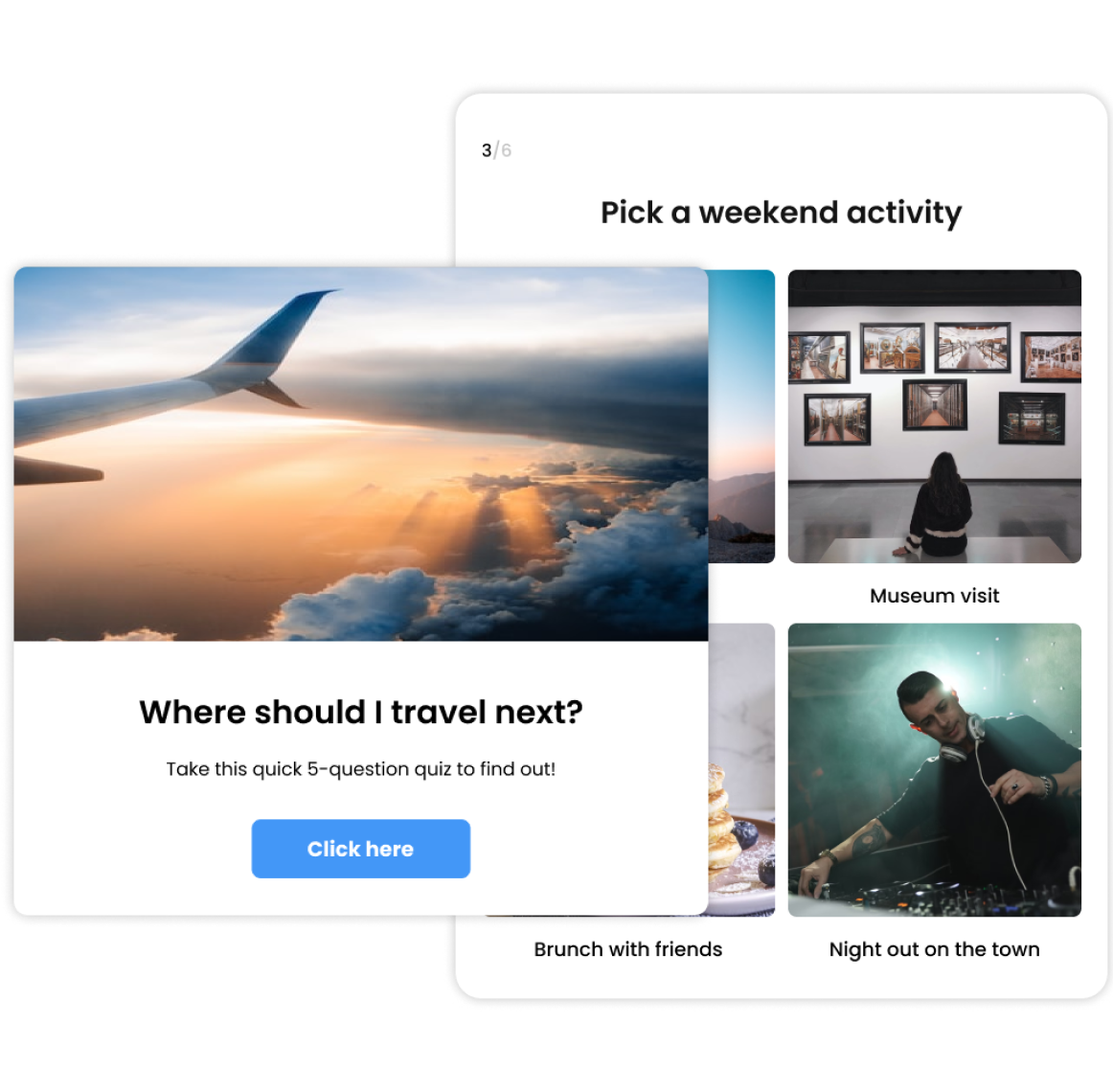Quiz Funnels That Get More Customers, Sales, and Leads
Make a quiz funnel that converts in no time with our free quiz maker. Reach more people, boost participation rates, and get more sales. It’s quick and it’s easy.
Trusted by 100,000+ customers across 190 countries
Quiz Funnel Templates & Examples
Hundreds of templates for every use-case or scenario.
What is a Quiz Funnel?
A quiz funnel is a type of customer journey that leads to conversion. Similar to a marketing funnel, it has four stages:
1. Awareness Stage
Capture the attention of your target audience and create awareness about your quiz.
2. Engagement Stage
Build a connection with your audience and keep them engaged throughout the quiz.
3. Lead Capture Stage
Collect valuable information about your audience by converting quiz takers into leads.
4. Conversion Stage
Convert leads into customers.
Ready to create your own quiz funnel?
Make a QuizWhat are the Benefits of Using a Quiz Funnel?
With an 80% click-through rate and a 90% completion rate, quizzes are a must-have for your marketing strategy.
Increase Customers
A well-designed quiz can transform casual website visitors into loyal customers. By providing a personalized and engaging experience, quizzes can help improve dwell time, lower bounce rates, and encourage target customers to take desirable actions.
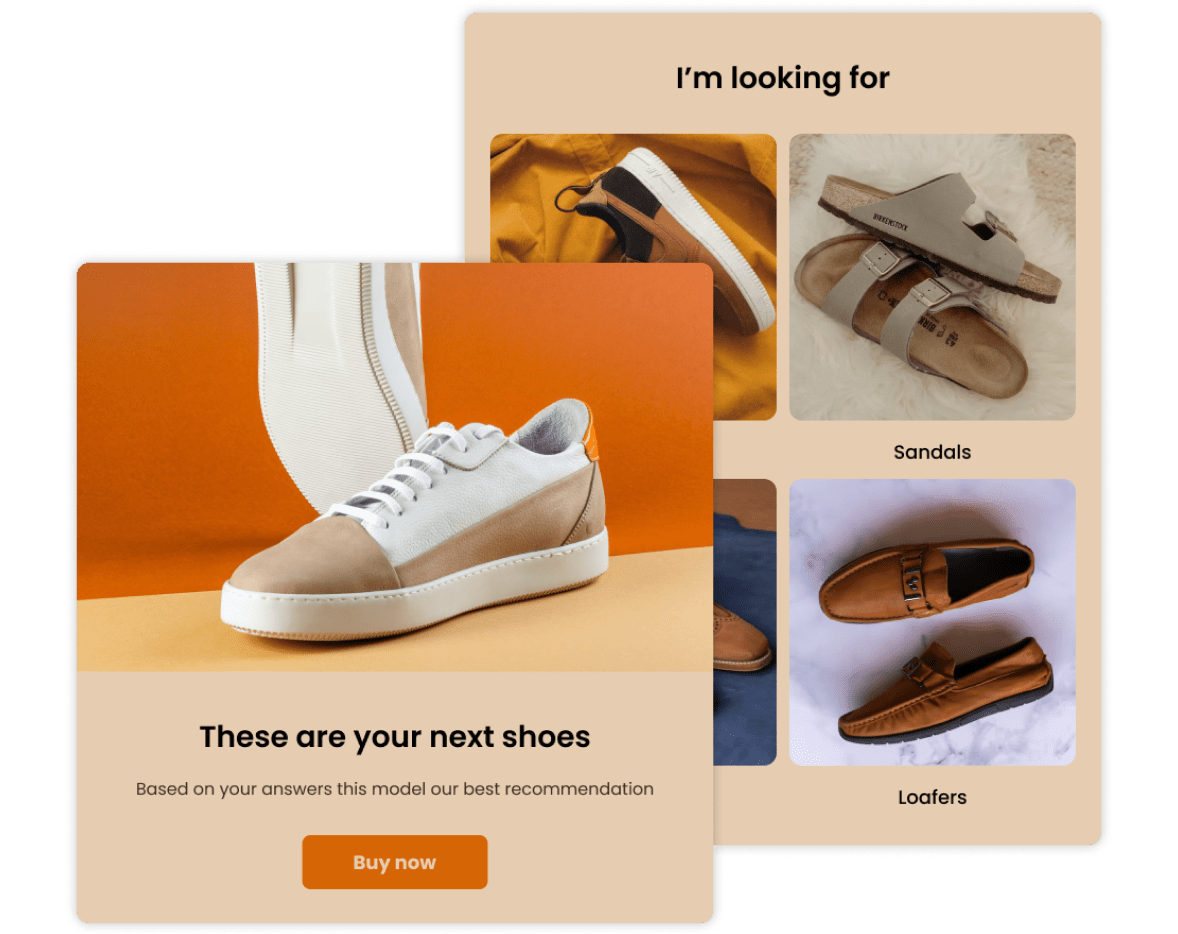
Use a Quiz Funnel as a Lead Magnet
Use an interactive quiz as a strategic lead magnet to encourage potential customers to join your email list or visit your website. Try offering an incentive, like exclusive access to their quiz results or a limited-time discount in exchange for their contact details.
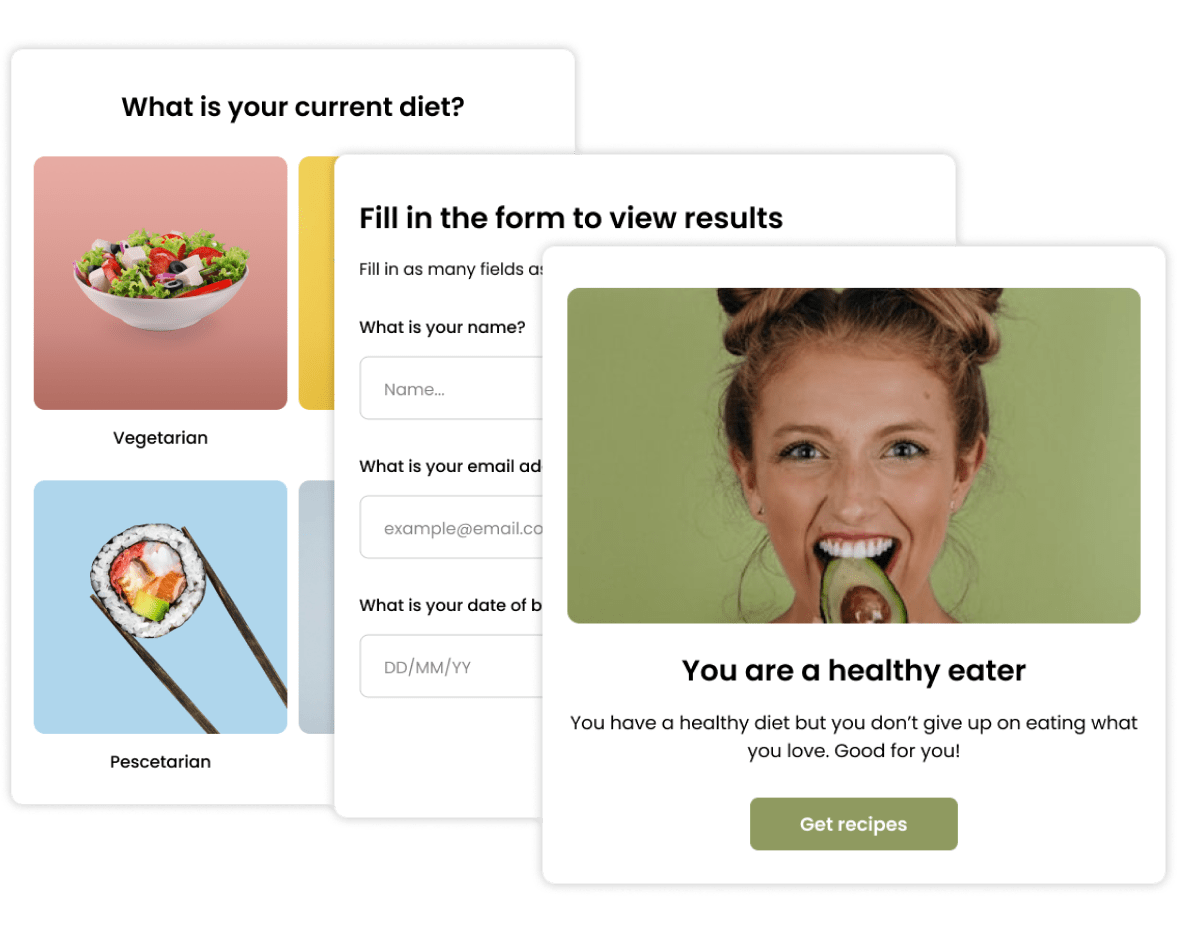
Boost Customer Retention
Quiz funnels can boost customer retention by offering personalized, engaging experiences through relevant and enjoyable quizzes. This creates a sense of belonging and loyalty among customers, driving repeated visits and purchases.
Plus, quizzes provide valuable insights into customer behaviors and preferences, allowing you to tailor your products or services to meet their needs and retain their interest.
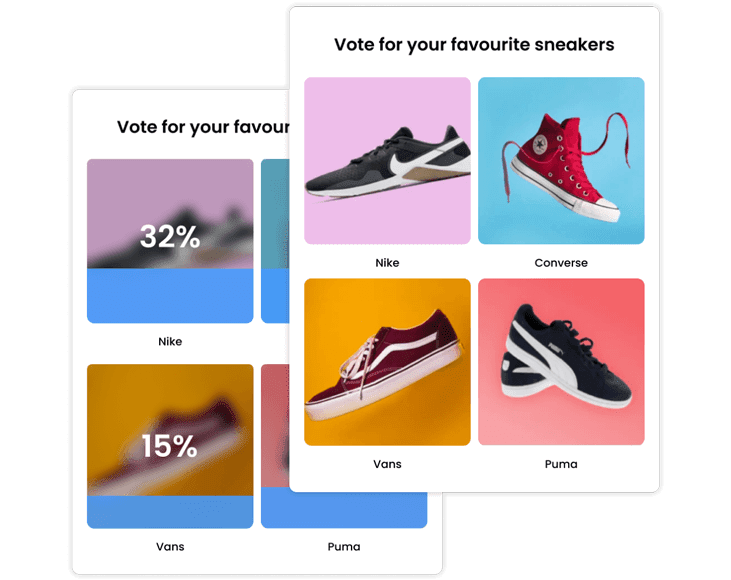
Audience-Focused Engagement
Quizzes give your audience real value from the get-go. A good quiz funnel is a powerful tool because it’s audience-focused. In other words, it’s more about giving your audience a fun experience, a meaningful moment, and useful information than it is about selling your product or promoting your brand.
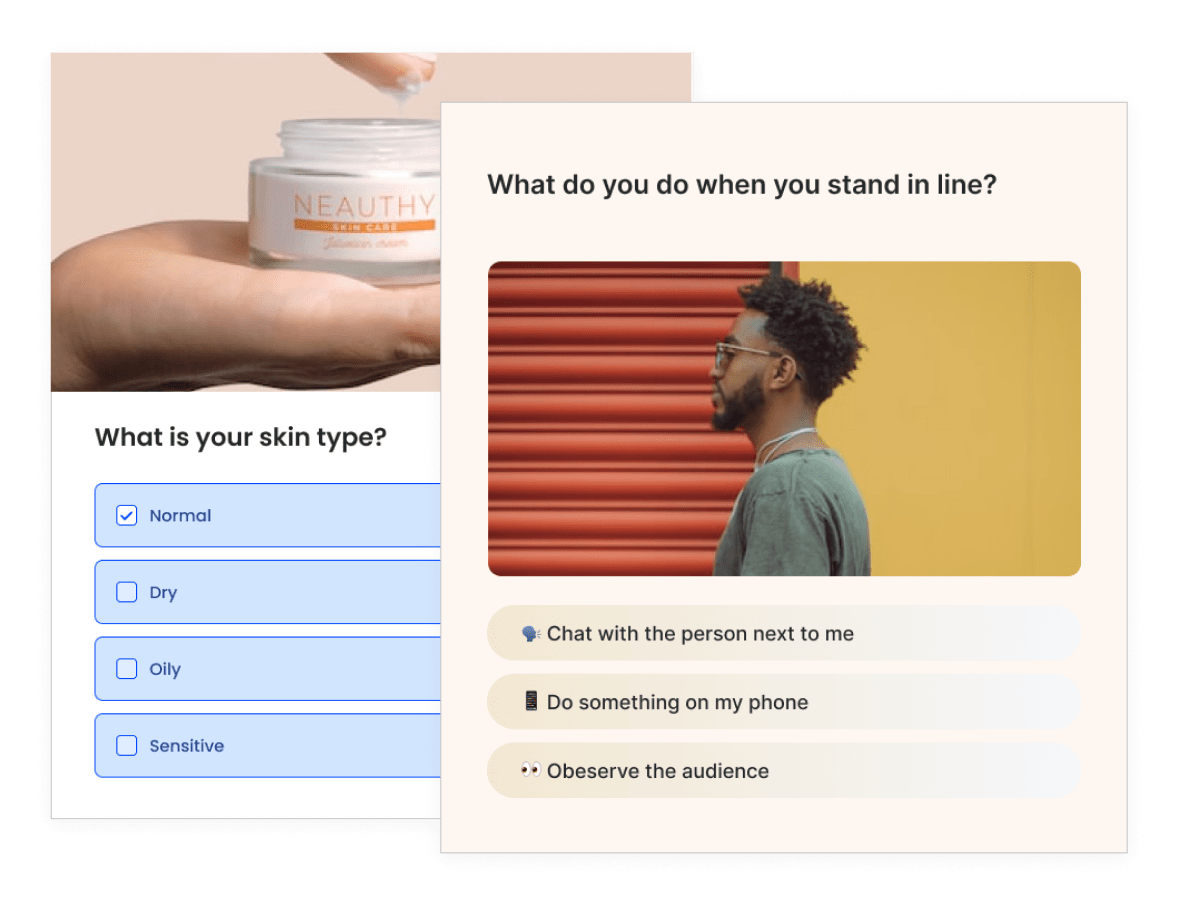
How Do I Make a Quiz Funnel?
Follow our step-by-step guide to create an effective quiz funnel for your marketing strategy.
1. Identify your audience
Like any marketing strategy, audience research is an essential first step. Once you get to know your audience, you can determine what type of experience to offer them and how to match them with your products or services.
2. Define the flow of your quiz funnel
Now it’s time to map out your funnel. Begin at the destination: What’s your goal? Where do you want people to land, and what actions should they take? Now, backtrack to the start, considering your audience. Where can you grab their attention? Maybe it’s your website, a quiz landing page, emails, or social media.
Once you’ve got a plan ready, break it up into steps and scenarios. The goal is to make your quiz funnel as simple as possible to avoid losing your potential customers along the way.
3. Decide on a quiz type
Choose the right quiz type that works best for your goal. For example, you can use Opinion Stage’s personality quiz maker to create a diagnostic personality quiz that collects leads or recommends products. On the other hand, a trivia quiz competition could be great for engagement and product awareness, especially if you offer one of your products or a special discount as a prize.
4. Create quiz result cards
Now it’s time to make the quiz result cards, also known as quiz outcomes. These cards are the outcome of the quiz, and they provide a personalized result for each participant based on their answers to the quiz questions.
The result cards are the end of the experience from your audience’s perspective, but for you, they’re just the beginning. This is where you want them to take action, whether it’s to become one of your email subscribers, buy your product, or share your quiz. All outcome cards need to leave your prospect feeling good, ready, and able to take the next step.
5. Write the quiz questions
An average quiz has about ten questions, and it’s a good idea not to exceed that number. Each multiple-choice question should be short and easy to understand, with between two and five answer options.
To make your quiz feel more personalized, you can use skip logic, which takes your respondents down a question path that’s relevant to them. For example, if someone selects chocolate as their favorite dessert, you could send them to a series of chocolate-related questions. In contrast, if someone chooses fruit, you could offer them a completely different set of questions.
Aside from being fun and engaging, your questions should also help segment your audience into different groups or personas. After all, while giving them value you also want to gain crucial information for your business, such as their goals, problems, or spending power.
6. Add visual elements
Use images, videos, and GIFs to make your quiz more engaging and help clarify your questions. Visuals allow you to expose potential customers to your brand design, visual language, and flattering images of your products. To help your quiz takers feel more at home and connected with your brand, include images that depict potential members of your target audience (e.g., people of the same age group or ethnicity).
7. Add a lead form
Remember to add a lead form if you’re using a quiz marketing funnel to grow your email list or gather leads. You can ask for their name, phone number, email address, and more, but it’s best to keep it down to the bare minimum. Ask only for the information you need, to prevent driving people away.
A few points to remember here:
- Tell them what they will get in return. In most cases, this means informing them that they will see the results after they fill in the form.
- Tell them what you will do with their contact information to reduce anxiety and increase trust. For example, you can tell them that they will receive a monthly newsletter with personalized product recommendations and discount codes in return for their email address.
- It may also be a good idea to verify the validity of the contact info they provided before you send the follow-up. It’s super easy with a free email checker and it reduces bounce rates significantly.
8. Drive traffic to the quiz
Now that your quiz funnel is ready, it’s time to promote it. Treat your quiz marketing funnel like a product, strategize for organic or paid traffic, and align your promotion strategy with the location of your quiz – whether it’s on your homepage, integrated into a blog, on a separate landing page, or even on social media, WhatsApp, or in email campaigns. Choose the location based on your goals and audience convenience to ensure your quiz gets the traffic it deserves.
9. Test & improve
Even after you’ve published your quiz, you can continue to optimize it and improve its performance. The best way to do this is to keep track of your user’s behavior and make appropriate changes.
If you’re using our quiz maker software all you need to do to view your data is click on ‘Results’. Here, you will get a real-time snapshot of the number of views, starts, completions, leads, and more. You can use this information to understand how well your quiz is performing, identify possible issues, and fix them.
Ready to create your own quiz funnel?
Make a Quiz14 Quiz Funnels You Can Try Today (Templates Included)
Not sure what type of quiz to create? We’ve rounded up 14 quiz funnel templates and examples to get you started.
1. Lifestyle Quiz
This type of quiz funnel has high participation and completion rates, which is why it’s popular in digital marketing campaigns. These quizzes help direct prospects to certain products or services that align with their lifestyles. The results will show valuable information, such as where your prospects should travel or live, nutritional recommendations, or hobbies they should take up.
For example, Airbnb uses this strategy to its advantage with a quiz determining users’ travel styles. The quiz, promoting Airbnb’s trips and experiences, not only engages travel enthusiasts but also offers personalized trip itineraries, enhancing the user experience and encouraging further exploration on the site. It’s an effective marketing approach because it appeals to the interests of potential customers and guides them toward potential bookings.
2. Personal Style Quiz
Personal style quizzes help save prospective customers the frustration of trying to figure out what kind of style would suit them. This fun quiz lets you showcase your merchandise and expertise, helping prospects narrow down products, reducing bounce rates, and increasing conversion rates.
Eyewear brand Zenni Optical’s personal style quiz helps prospects find the perfect glasses for their face shape, personal style, and lifestyle. This successful quiz funnel grew their email list, generating 29,400+ leads and increasing their return on investment by 9,655%. To create the quiz, Zenni Optical researched keywords and their audience, identified eight different personas, and made quiz outputs to match each one.
3. Product Discovery Quiz
Product discovery quizzes sit at the top of the marketing funnel. They raise brand awareness and steer potential buyers toward your products. Sometimes, they are disguised as self-discovery quizzes since they are fun and addictive, and people like to share them with others.
Beardbrand’s engaging ‘What type of Beardsman are you?’ product recommendation quiz funnel uses quirkiness to captivate prospects. The quiz concludes with a lead form, offering a giveaway hint in the first email. Upon submitting their email, prospects receive personalized results featuring their Beardsman character and corresponding image. This effective quiz funnel works because it makes participants feel understood and part of a community.
4. Product Recommendation Quiz
You can use product recommendation quiz funnels when prospects have a clear purpose in mind. They could be familiar with your brand or product type but aren’t sure which product to purchase. They’re effective for boosting purchases and reducing abandoned carts in online retail.
Quench values customer time with a brief four-question water filter quiz. This efficient product recommendation quiz minimizes dropouts by providing a clear product suggestion and a prompt call to action. Following the quiz, users can schedule an appointment with a local water expert, paving the way for a focused and confident purchasing decision.
5. Consultation Quiz
Use this quiz type to attract clients by helping them diagnose a problem and suggesting a solution based on their responses.
Better Help, an international online mental health service, uses a consultation quiz funnel as the main element of its homepage. The quiz is the driving force behind the big first step potential clients need to take. It asks them about their pain, needs, and therapist preferences to help them find a therapist that’s the best fit for them. The quiz ends with a lead form and a call to action to get started with therapy and pay for the first month.
6. Diagnostic Quiz
A diagnostic quiz offers users a diagnosis based on their answers to questions on a certain topic. For example, you could help users if they are eligible for citizenship, onboard patients, or find out if someone is a good fit for a product/service.
Outbrain’s ‘Are you ready for native advertising?’ quiz transforms a seemingly mundane topic into an engaging experience. It features an attractive cover, a clear call to action, and concise, expertly crafted questions with vibrant images to maintain user engagement.
This strategy helps the quiz build trust and establishes the company as a reliable expert in the field. Following this example, you can create an engaging quiz funnel on any topic, enhancing your brand and showcasing your expertise to a broader audience.
7. Gated Offer Quiz
A great way to catch a prospect’s attention and motivate them to complete a quiz is to use a gated offer. These quizzes build up towards a tempting offer, like a discount, a product, or a service. To access the offers, participants must provide information or take further actions, such as submitting their email address or completing additional steps beyond the initial quiz questions.
Fabletics did a great job at this by welcoming website visitors with an exclusive ‘2 Leggings for $24’ deal. Interested visitors can secure the special offer by completing a brief quiz. Once completed, Fabletics asks for their email address by saying, ‘Your exclusive offer is one click away.’ With this method, Fabletics gains new leads that they can later retarget with their email marketing campaigns. They can also convert them into customers with the enticing offer.
8. Incentivized Quiz
An incentivized quiz is a variation of the gated offer quiz. With this quiz, participants receive the tempting offer immediately after completing the quiz. The focus is on immediate gratification and encouraging engagement during the quiz experience.
For example, Skinny Mixes, a beverage brand, created a fun, incentivized quiz by allowing potential customers to create their perfect beverage recipe. They asked visitors about their mood and favorite drink, then offered them drink recipes and a coupon code for a free syrup.
9. Problem-Solution Quiz
If your prospects are having trouble finding a solution to their problems, why not help them solve it with a quiz? The first step here is to identify what problems your products or services can solve. Ask questions that help analyze the problem and use the answers to direct your prospects to the right solution.
An excellent example of this is Murad’s skincare quiz. Their quiz is not only fun and exciting but also solves a problem and leads prospects down the sales funnel. Murad’s quiz asks participants no more than seven quick questions about their skincare regimen. The questions are friendly, well-designed, and easy to answer. After participants answer them all, they get a visual list of products based on their answers, making it easier for them to shop for the items they need.
10. Scored Quiz
This quiz type works by giving every question a point value. The quiz taker gets a score based on the total point value (and not the number of correct answers).
Scored quizzes are often used in education as they let teachers and trainers decide which topics and questions should have the most weight in the learning process. They’re also great for micro-learning and independent skill development.
For example, the National Science Bee holds science trivia quiz competitions for elementary, middle, and high school students. The quizzes are designed to test students’ knowledge in various science subjects, such as biology, chemistry, physics, and engineering.
11. Lead Generation Quiz
This quiz form offers your target audience an entertaining experience and valuable information. With this powerful combination, lead-generation quizzes can increase conversion rates by 500%. They’re very effective because they allow you to build trust with your audience before asking them for anything. The strategic placement of the lead form, after the questions but before the results, further entices your audience to share their information with you. You can also use AI lead generation software to further optimize the lead process, ensuring that the most relevant and high-quality leads are captured.
Ipsy, a beauty membership service, created a great example of a lead generation quiz. The quiz asks 12 short and direct questions, using photos or illustrations for most options. Once the participant answers all the questions, a lead form appears, requiring prospects to enter their email address, age, and password to receive a monthly beauty product package for a special price. By using this quiz funnel, Ipsy is able to grow its email list and get to know its target audience, which helps it increase sales by offering personalized product selections.
12. Awareness Quiz
Are you passionate about a cause? An awareness quiz is your go-to tool. Perfect for spotlighting and educating on issues, it sparks active involvement and creates a more significant impact than static content, like social posts or articles.
For example, the American Red Cross created a home fire drill quiz, allowing you to assess how prepared you are in the event of a home fire. They’ve done an excellent job of using an interactive quiz to raise awareness about an important subject, making the learning experience informative and engaging.
13. Self-Discovery Quiz
The most popular quizzes are about self-discovery. This is because people naturally have the instinct to discover more about themselves and reveal previously unknown information. You can use this to your advantage by connecting it to your products or services.
A good example is Pampered Chef’s ‘What’s your cooking personality?’ quiz, strategically designed to boost sales, foster engagement, and deepen content discovery. This visually appealing quiz aligns with the brand’s design, voice, and tone. It guides participants to personalized pages with product suggestions, additional content, and recipes, effectively converting prospects into customers and increasing on-site engagement.
14. Engagement Quiz
Engagement quizzes can be a fun personality test that people love to share with their friends or an exciting competitive trivia. They’re usually light-hearted, bright-colored, trendy, and silly, making them great for social media sharing.
Buzzfeed pioneered this quiz type, but since Buzzfeed only lets you create on their platform, it’s often better to use a different creation tool but still use the super engaging BuzzFeed style.
FAQ
Do quiz funnels work?
Yes. Quiz funnels effectively engage audiences and guide users to desired actions. Since quizzes are fun, interactive, and highly shareable, they’re an excellent tool to use in marketing strategies.
What is the best quiz funnel software?
The answer depends on your specific needs and preferences. However, if you’re looking for a user-friendly platform that allows you to create quizzes optimized for conversion, then Opinion Stage’s quiz builder is definitely worth considering. You can create a quiz from scratch, use a template, or generate a quiz in no time with our handy AI quiz maker.
Is quiz funnel software free?
Yes. With Opinion Stage, you can create unlimited quizzes for your quiz funnels using our free plan.
What is a quiz marketing funnel?
A quiz marketing funnel is a strategic marketing approach that uses quizzes to guide potential customers through a series of stages, from initial awareness to final conversion. It involves creating quizzes that cater to specific audience segments, capturing leads, and then using those leads to drive desired actions, such as making a purchase or signing up for a service.
What is a funnel template?
A funnel template is a pre-designed framework for creating marketing funnels, quiz funnels, or sales funnels. To get a head-start on your funnel, you can choose a quiz template from Opinion Stage’s template library. Hundreds of templates are available for every use case, and they’re also optimized for maximum conversion.
What is cold traffic?
Cold traffic refers to individuals who haven’t yet encountered your brand. Unlike warm or hot traffic, they require more attention and engagement to introduce them to your offerings and capture their interest.
You can easily do it yourself, no need for a developer
Create a Quiz Funnel









